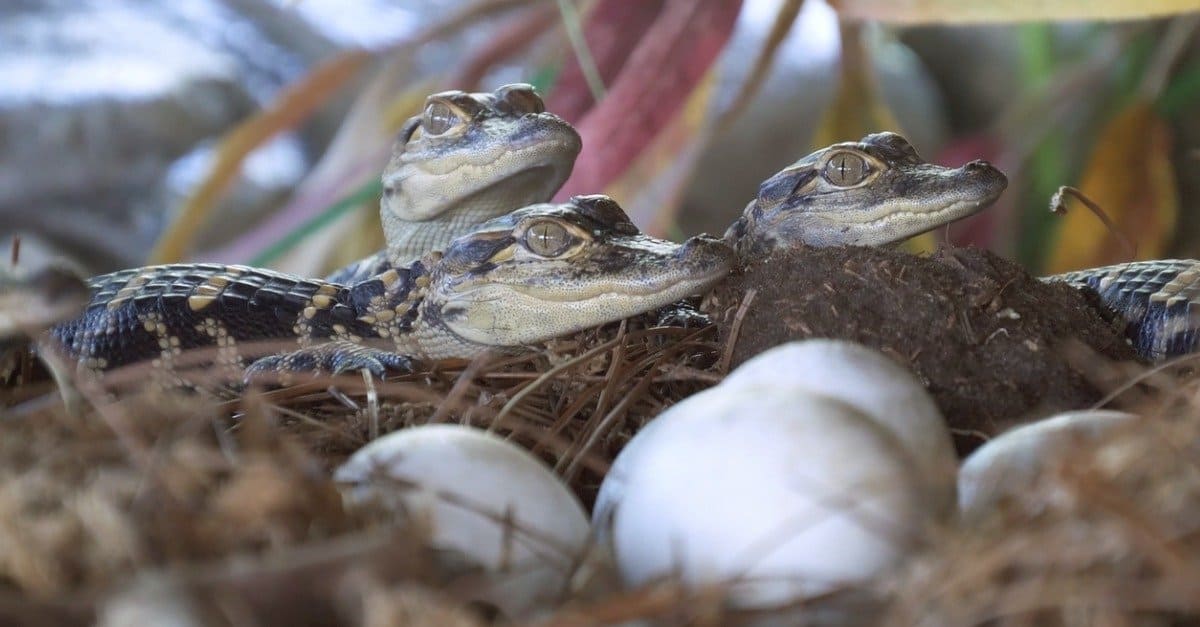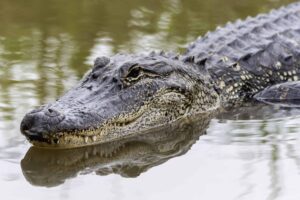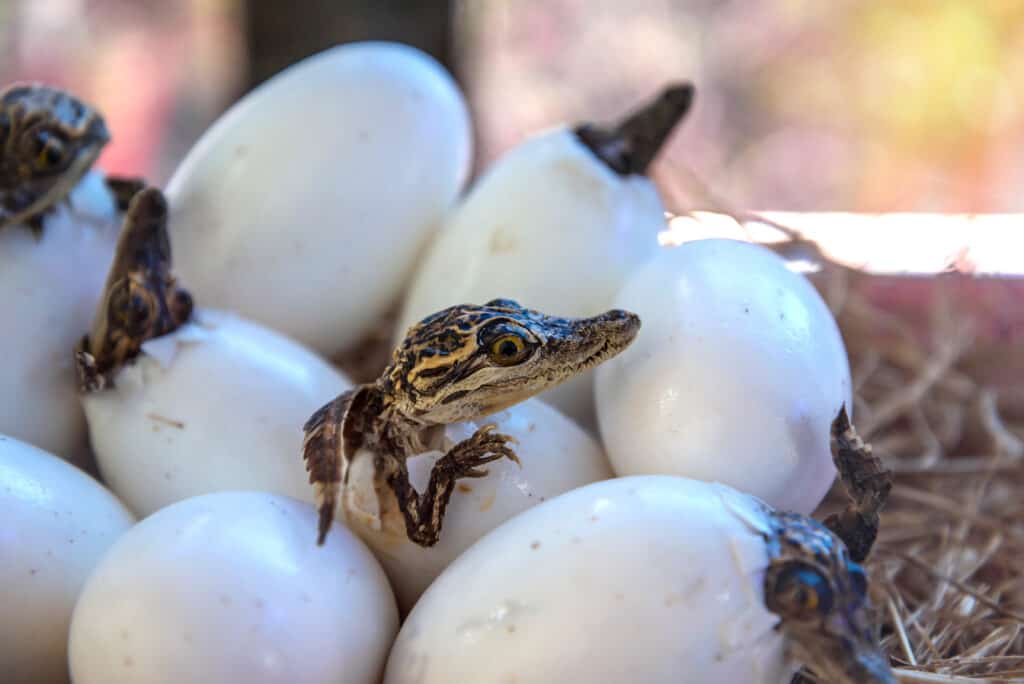
Alligator eggs can survive under a wide variety of conditions, while at the same time being highly susceptible to certain changes in habitat.
©iStock.com/Casanowe
Have you heard about alligator egg hunting, and want to know what it is and how it differs from regular alligator hunting? It’s an interesting profession that usually involves you taking care of alligators from the moment you take them out of the nest until it’s time to harvest a full-grown alligator.
Keep reading to learn more about alligator egg hunting, and why it’s popular in Florida, as well as Louisiana and Georgia.
Popular Doesn’t Mean Easy
Alligator egg hunting in Florida is the process of going through select public land or private lands and finding alligator nests. After they’re cracked open, those with permits are allowed to take roughly half of the egg population.
These eggs then get sent to farms or other states, depending on the demands that year. In some states, the eggs are raised until they are mature, and then some have to go back into the wild. However, in Florida, they can all be kept and raised by farms before they’re eventually harvested.
Egg Hunting Permits Involve a Lot of Math
Alligator egg hunting is carefully calculated and regulated by the Florida Fish and Wildlife Conservation Commission (FWC). Not only does the FWC calculate how many eggs to take to have a good population for growth and hunting.
That’s not all these biologists calculate, though. They also have to take into account the natural life cycle. Some animals depend on alligator eggs as a food source. If all the eggs were harvested, or too many in a year, it would impact several other animals that depend on this food source.
It’s Not a Cheap Profession
In Florida, there are a lot of rules surrounding alligator egg hunting. They may only be hunted on private land or select public land. Alligator egg hunters must pay the landowner for each egg collected. Depending on the going price for eggs, an average nest can bank a landowner over $1,700. Eggs usually cost somewhere between $12 and $13 per egg. In public lands, they must pay the state for each egg.
This is pretty pricey for an alligator farmer. On top of that, a collector must pay a biologist whenever they go out to collect eggs. This can cost up to $350 a day. As long as most of these eggs hatch, the farmers can make more than enough money to cover these costs. Unfortunately, there are always external factors that can hurt the farmer.
The Rules Are Strict
There are other rules as well. In Florida, only 30 farmers receive permits to collect eggs a year. There are some exceptions, such as some veteran-focused programs throughout the state that let veterans collect eggs in groups and sell them to farmers. However, this severely limits the number of farms that can be open at a time.
Each permit holder also has a limited number of nests they’re allowed to open each year. Since nests are buried under the earth, there’s no way of telling how many eggs are in the nest, and if they are in good condition until it’s already opened. On average though, each permit holder gets somewhere around 1,200 eggs a year.
What Happens to the Eggs After They’re Hunted?
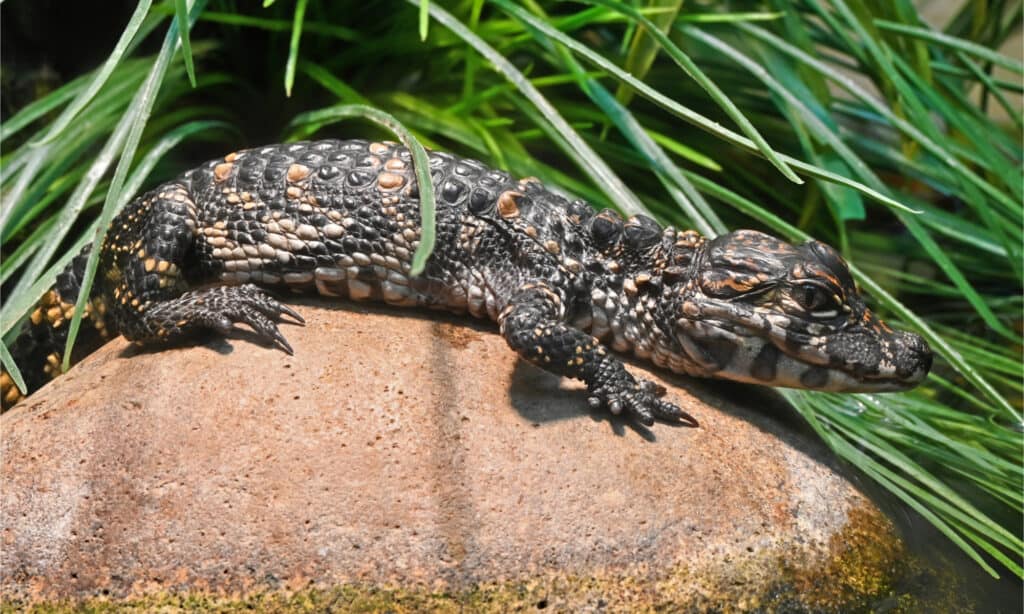
Alligators may be small at birth, but they can grow pretty big, given enough time.
©Andy Crocker/Shutterstock.com
Despite the name, alligator eggs aren’t hunted and disposed of. The eggs collected go to alligator farms. These farms then raise the eggs, and later the alligators that hatch out of them. In some states, a certain number of these alligators have to be released back into the wild. However, any kept on the farm are allowed to be sold. The hides, meat, and even teeth can be sold to collectors, restaurants, and stores.
Alligator farmers can make quite a bit of money, but it’s also costly to hunt for eggs. Some of the farmers keep all the eggs for themselves to sell off the meat and hides. Some states, like Louisiana, can’t get enough eggs to keep their farming going. Florida farmers will sometimes sell a portion of their eggs to Louisiana to make a quick buck.
Inside the Alligator Farming Industry
Some farmers have adapted by opening up their farms to the public so they can see captive alligators for a price. This allows them to make even more money. They also make a profit off of gators that aren’t yet old enough to harvest.
After two years on the farm, many hunters harvest their alligators. Usually, the guideline is to harvest once they get somewhere between four-and-a-half feet and five-and-a-half feet long. Females are highly desirable because they grow at a faster rate than males in the first few years.
The primary goal of farmers is to sell the hides for a good price. Alligator meat, on average, only makes about a quarter of the price of the hide. It’s considered a by-product by many hunters for this reason. Some farmers will keep the meat to feed their families. Others sell it to get just a little more profit.
Why Hunt For Alligator Eggs?
With farmers collecting a thousand eggs or more every year, you may be wondering why they don’t just breed their alligators in captivity. This is because it’s almost impossible to get alligators in captivity to lay eggs. By hunting alligator eggs, the farmers are ensured that they get a relatively stable replacement population every year.
So Why Is Alligator Egg Hunting So Popular?
You may want to jump onto alligator farming once you see the profits. Though each nest can cost over $2,000 to harvest, the end price is worth it when you realize that 1,000 alligators (roughly a year’s worth of alligators) can provide you with nearly $300,000. In Louisiana, the alligator farming industry nets $50 million annually, just for the skin.
As the demand for alligator meat increases in restaurants, the profit for meat is increasing as well. If the demand continues to increase, it may end up being almost as profitable, if not more so, than the skins.
The price of skins and meats do fluctuate. When skins and meat are in demand, many people are quick to try their hand at alligator farming. They don’t often realize how long it takes to set up the business and actually reach a point where you can harvest the alligators you have.
Is Alligator Egg Hunting a Good Business?
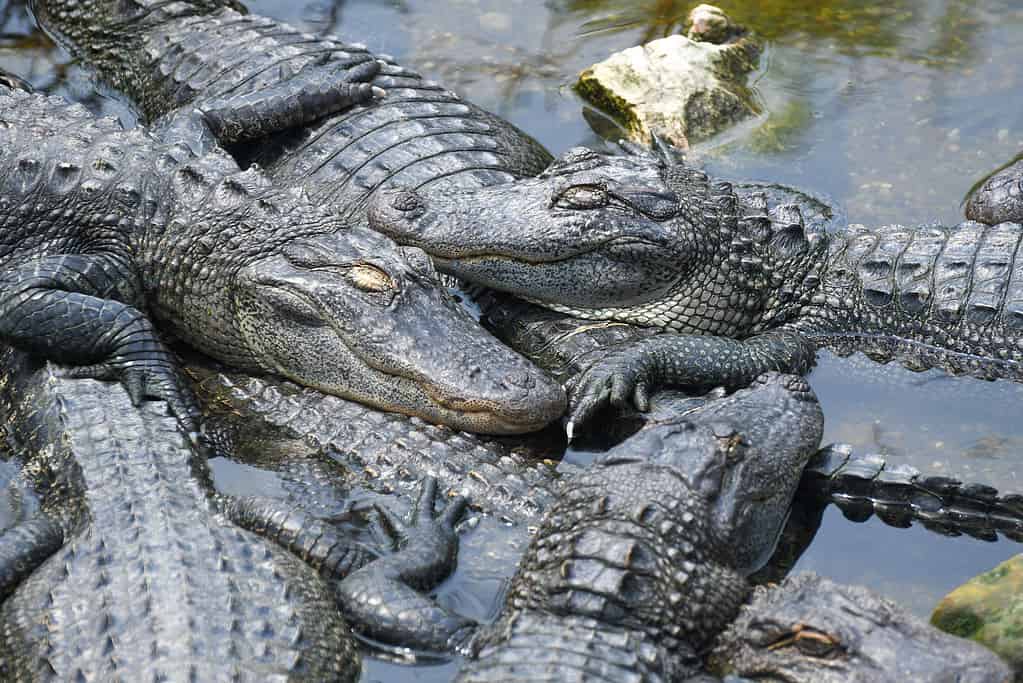
Alligators don’t mind spending a lot of time next to each other, which makes farming rather easy.
©Chris Drahos/iStock via Getty Images
With alligator hunting, selling the meat and hides will sometimes fetch you a pretty penny but the market is very volatile. Some years, you’ll barely cover the price of your tags, while other times you’ll make back triple. Alligator egg farming, on the other hand, is very stable.
Benefits Veterans
It’s also an easier job for many people. Alligator hunting is great for the strong and the able-bodied. It doesn’t work well for those who are older or have health issues and aren’t able to fight alligators for hours at a time. A lot of companies will work with veterans to give them the chance to go egg hunting.
Not only is it a practice that helps give them some money, but it also gives them things to do. When a veteran is disabled, it’s not easy for them to find activities to participate in. Nor is it easy for them to always afford it. Alligator egg hunting in Florida allows them something to do with their free time for a low cost if it’s not free.
They don’t even have to participate in the actual raising of the alligators, thanks to the specific programs for veterans to just go and collect eggs.
Dangers
While not quite as dangerous as alligator hunting, alligator farming is still a dangerous profession. Any time you go to collect eggs, you risk running into a very angry momma alligator. You also have to feed, take care of, and provide adequate habitat for thousands of alligators. This means that you risk injury and bites every day.
If you don’t have money put away for farming, you also risk losing money in bad years. Poachers not only take eggs in nests, limiting how many you can get a year but they’ve been known to break into farms and steal incubating eggs.
There are also bad years, where alligators don’t hatch as much as they should, reducing your profits. Of course, there are also other times when you’re constantly losing money. Alligators need a lot of food, and sickness in a small farm can quickly spread to the whole population. This means you need to pay for vets and medicine occasionally.
Limitations
There are other, though not so deadly, dangers as well. First, it’s a limited job. Only three states allow alligator farming; Florida, Georgia, and Louisiana. Louisiana is a hard state to get started in because there aren’t enough eggs to harvest in the state to keep up with the demands of the farms.
Florida is also difficult to farm in, though for a different reason. The FWC only hands out 30 alligator farming permits each year. This means that unless you’re one of the top farmers, you’re likely not getting alligators every year. It may be difficult to get your first permit as well, as the FWC isn’t always keen on giving new farmers these precious permits. In an effort to prevent illegal poaching of alligators and alligator eggs, however, the FWC is willing to help new farmers out by pointing out potential loans and providing permits to newer and reputable farmers.
Important Facts About Alligator Egg Hunting
There are some important facts that everyone needs to know about egg hunting before they give this activity a try, no matter what the rules in their area are.
Alligator Genders
In most states, including Florida, there are rules determining how many eggs you must have hatch, how many hatchlings must survive, and the gender of the hatchlings. Now, you may be wondering why people can get in trouble for not hatching the right gender.
This is because it’s relatively easy to determine, and influence, the gender of alligator eggs. The temperature of the nest determines what gender the hatchlings will be when they hatch.
The higher the temperature, the higher the chance of the eggs being male. Usually, any temperature above about 92 degrees Fahrenheit leads to primarily males while anything below 88 degrees Fahrenheit leads to mostly females. The temperatures in the middle lead to a fairly even mix of the two genders.
Alligator Eggs Are Fairly Weak
The average size of a clutch of eggs is around 34 to 38. Out of this, only 24 will hatch. Then, after a year, only 10 of the hatchlings on average survive. This means that there’s less than a third of all eggs surviving past a year.
There are many reasons that alligator eggs don’t survive. Predators are a big problem. Many animals eat eggs for survival. Additionally, there are some predators that enjoy attacking and eating young hatchlings before they grow big enough to be a threat.
There’s also the issue of alligator embryos drowning in their eggs before they hatch. Like several other reptiles, alligator eggs shouldn’t be turned or tilted much from their original position inside the nest. Otherwise, they risk drowning in the fluids inside the embryonic sac.
Studies have shown that this may be a myth, but there is some truth to it. While reptiles don’t necessarily hatch less with egg turning, post-hatching mortality is as high as 37.5 percent. Meanwhile, non-turned eggs only have a 4.5 percent post-hatching mortality.
Thank you for reading! Have some feedback for us? Contact the AZ Animals editorial team.

